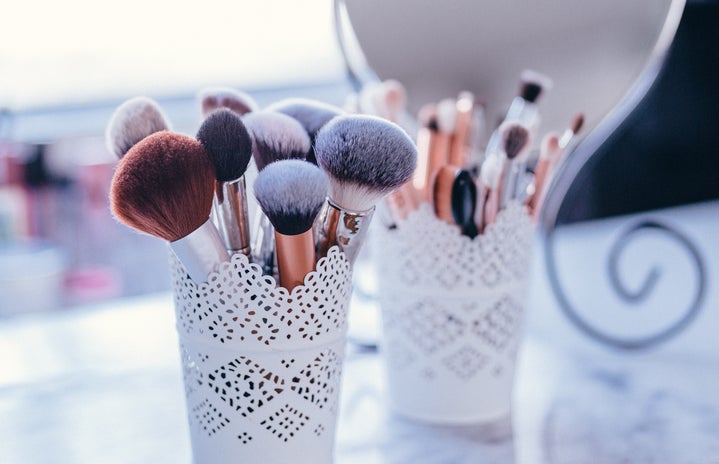Summer is upon us, and while that means sundresses, flip-flops, and fruity poolside cocktails, for many of us it also means dry skin, sunburns, and clogged pores.
As the weather changes, you need to change up your beauty routine to keep your skin looking and feeling its best. What may work on your chapped winter skin probably won’t give you the perfect summer glow you’ve been looking for. But don’t worry – we did the research for you to give you the details on what to do to look your best in the warmer months.
The Problem: The heat makes you sweat, so your pores are clogged and your face is breaking out.
Why it Happens: Your body’s natural reaction to heat and humidity is to produce sweat to cool you down, and with that sweat comes more oil from your skin than normal. Once this oil gets trapped inside our pores, it wreaks havoc on our skin. “Little hairs in our pores help wick out sweat from our bodies,” says Madeleine Homes, owner of La Papillon Spa in Maryland. “If the sweat gets trapped against the skin, it can be a breeding ground for bacteria and acne.”
What You Can Do: “Regular exfoliation can keep the follicles from clogging,” Homes says. There are tons of exfoliation scrubs that you can buy from your local drugstore, or, for a frugal solution, you can mix up your own. Mix one part sugar with two parts olive oil and gently scrub the mixture on your face to get rid of dead skin and oil. While washing your face, make sure you use warm water to open up your pores, and once you’re finished, rinse with cool water to close your pores again, suggests Dr. David Bank, a dermatologist and author of Beautiful Skin – Every Woman’s Guide to Looking Her Best at Any Age. This helps get rid of the bacteria buildup, and makes breakouts less likely as well. Homes also suggests keeping your hands off your face and wiping down your sunglasses and cell phone regularly to avoid clogged pores. “Even changing or showering promptly after working out can help cut back on the chances of a breakout,” she says.
The Problem: Your feet are exposed for the world to see, and instead of being soft and smooth, they’re scaly and dry.
Why it Happens: Similar to how your skin gets dry and cracked in the winter from wind and cold, your feet are exposed to harsh elements during the summer that cause them to feel and look like an alligator. During the summer, you’re wearing sandals, walking by the pool, or walking on the beach, and these harsher conditions create rough feet. “We are exposed to harsh chemicals during summer time such as chemicals in pools, sunscreens that do not have proper moisturizers, and salt in oceans which can all dry out the skin,” says Dr. Bank. Even when you’re inside, the lower humidity from air conditioning can pull moisture out of your skin as well.
What You Can Do: While in the shower, Homes suggests using a pumice stone on your feet. This will slough off the layer of dead skin and reveal the softer, smoother layer beneath. After the shower and before bed, Homes suggests covering your feet with a dense foot cream that contains glycolic acid. The glycolic acid deeply penetrates the skin, getting moisture to where you need it most. Dr. Bank also suggests using moisturizer with an SPF, limiting your sunbathing, and showering with lukewarm water instead of hot water.
The Problem: Your summer romance is heating up, but your pout is dried out, flaking, and sunburned.
Why it Happens: The heat from the sun draws moisture out of the skin and the lips, and without that moisture, lips can get flakey. “The sun can dehydrate any area on the body, especially the lips which have no natural oil in them,” Homes explains.
What You Can Do: All year round, and especially during the summer, use a lip balm that has SPF in it. This will not only prevent the sun from drawing out moisture, but it will also protect them from harmful cancerous UV rays. For a perfect pucker, Homes says use an anti-dehydrant ointment like Aquaphor at night. Dr. Bank suggests using Softlips PURE 100% Natural Lip Polish to help exfoliate and moisturize your lips.
The Problem: You spent too much time in the sun and now you’re the color of a fire truck—and you feel like you got hit with one too.
Why it Happens: Anytime the sun darkens your skin, it means it’s doing damage to it, regardless of if it’s a pretty tan or a painful burn. The sun’s harmful rays penetrate into your skin and seriously damage the skin tissue. “With a sunburn, the skin becomes incredibly inflamed, both internally and externally,” Homes explains. “It causes trauma to the skin tissue, which leads to premature aging while also increasing your chances of skin cancer.” The heat from the sun gets trapped inside the skin, making it hot to the touch and tightening your skin.
What You Can Do: “Take an ibuprofen immediately to help calm from the inside out, and apply cold milk or plain ice water compresses to help with the burn,” Homes suggests. “Massage aloe vera gel or vitamin E into the skin to help heal the burn and take some pain away,” Dr. Bank says. Once the initial pain of the burn is over, make sure you wear loose cotton clothing to avoid irritating your burn, and drink plenty of water to rehydrate your skin. Use a topical over the counter hydrocortisone cream to help reduce the redness of the skin, says Dr. Bank, and make sure you continue to moisturize with lotion and aloe.
Other Tips & Tricks:
- Always wear sunscreen. Even just a little exposure to sunlight can damage your skin cells, which causes skin aging and increases your risk of skin cancer, says Dr. Linda Stein Gold, director of Dermatology Clinical Research in Detroit. Make sure you apply SPF of at least 30 before sun exposure, and even if it’s waterproof, always remember to reapply.
- Skip heavy foundation. While heavier foundation is okay in the winter when your skin is dry, as temperatures rise, your body naturally produces more oil, and mixed with a heavy foundation, you’re more prone to breakouts. Instead, Dr. Gold suggests using a lighter mineral makeup bronzer to give you a natural glow without blocking your pores.
- Eat fruits and vegetables, and make sure you drink water to stay hydrated. The sun steals moisture from your skin, so it’s important to always drink water to replenish that water. If chugging water isn’t your forte, many fruits and vegetables can hydrate you as well. “Blueberries, cantaloupe, and other melons help stimulate collagen growth in your skin,” says Dr. Gold. By eating these fruits, you’re not only hydrating, but you’re adding collagen for beautiful skin.
Sources:
Madeleine Homes, owner of La Papillon Spa in Maryland
Dr. Linda Stein Gold, director of Dermatology Clinical Research
Dr. David Bank, a dermatologist and author of Beautiful Skin – Every Woman’s Guide to Looking Her Best at Any Age

